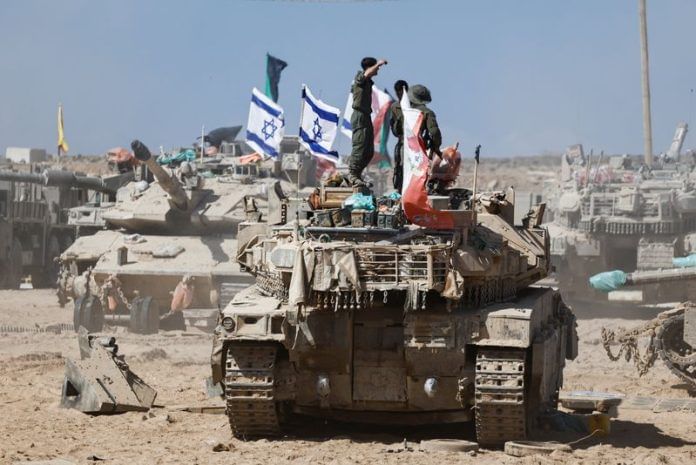By Nidal al-Mughrabi and Steven Scheer
CAIRO/JERUSALEM (Reuters) -Israeli fire killed three people near a ceasefire line in Gaza on Monday, medics said, with U.S. envoys expected in Israel to try to push forward the fragile truce that faced its gravest test so far over the weekend.
A Palestinian official close to ceasefire talks said efforts by Arab mediators and the United States would be stepped up on Monday, after helping restore calm in the enclave following a day of intense bombardment that killed at least 28 people.
Israel said it launched the strikes across the enclave on Sunday in response to a Palestinian attack that killed two soldiers who were operating within the agreed deployment line in Rafah, in southern Gaza, in what it described as a blatant violation by Hamas of the truce.
US TO URGE START OF SECOND PHASE OF CEASEFIRE PLAN
Despite repeated bursts of violence in the week since the truce was agreed, the U.S. envoys Steve Witkoff and President Donald Trump’s son-in-law Jared Kushner are expected to urge the start of the second phase of the ceasefire plan.
Monday’s incident, in the Gaza City suburb of Tuffah, was the latest along the “yellow line” demarcating Israel’s military pullback inside Gaza from the main populated areas, stoking new fears among Gaza residents.
Local health authorities said Israeli tank fire had killed three people. The Israeli military said forces had fired at militants who crossed the yellow line to remove the threat.
Gaza City residents said they were confused about where the line runs, with electronic maps available but physical markings yet to be established along most of the route.
“The whole area is in ruins. We saw the maps, but we can’t tell where those lines are,” said Samir, 50, who lives in Tuffah.
Israel’s military on Monday published video showing bulldozers towing yellow blocks into place to mark out the line.
Both Israel and Hamas have said they remain committed to the ceasefire after it broke down on Sunday. The armed wing of Hamas said it was unaware of clashes in Rafah, and had not been in contact with groups there since March.
Hamas has detailed what it said was a series of violations by Israel that it says killed 46 people and stopped essential supplies from reaching the enclave.
Despite an earlier threat to withhold supplies from Gaza over the brief truce breakdown, Israel’s military aid agency COGAT said on Monday that aid convoys would continue to enter the enclave.
However, it added that the Rafah border crossing between Gaza and Egypt would remain closed to the movement of people.
Trump said the ceasefire he brokered was still in place. Hamas leadership, he said, may not be involved in the violations. “We think maybe the leadership isn’t involved in that,” he told reporters aboard Air Force One.
REMAINS OF HOSTAGES STILL TO BE RECOVERED
Witkoff and Kushner’s visit to Israel, aimed at discussions on the next phase of Trump’s complex ceasefire plan, was scheduled before Sunday’s flare-up in violence, according to U.S. and Israeli sources.
However, Israel is unlikely to publicise any progress in the talks until the remains of more hostages are returned and it believes Hamas is able to hand over up to six more bodies immediately, out of the 16 still in Gaza. Other bodies may be hard to recover because of destruction in the enclave.
Meanwhile, Egypt will host talks in Cairo on Monday with Khalil Al-Hayya, Hamas’ exiled Gaza chief, over ways to follow up on implementing the ceasefire, the group said in a statement.
A Palestinian official, close to the talks, said the group’s delegation would discuss ways to push forward the formation of a technocrat body to run Gaza without Hamas representation.
Israel has not agreed to the idea in the past and insisted Hamas be stamped out of the enclave, defeated and disarmed, a demand the group never accepted.
Hamas and other allied factions reject any foreign administration of Gaza, as envisaged in the Trump 20-point plan, and it has so far resisted calls to lay down arms, which may complicate the implementation of the deal.
With the truce still uncertain, Gaza residents fear more violence.
“I felt my heart dropping to the ground, I felt the ceasefire collapsed,” said Abu Abdallah, a Gaza City businessman, displaced in the central Gaza Strip.
“What happened yesterday made people go crazy to buy food, greedy merchants hiked the prices, the deal looks so fragile,” he told Reuters via a chat app.
In an interview with CBS “60 Minutes” Kushner said the success or failure of the 20-point peace plan would depend on whether Israel and the international partners involved can create “a viable alternative”.
“If they are successful, Hamas will fail, and Gaza will not be a threat to Israel in the future,” Kushner said.
(Reporting by Nidal al-Mughrabi in Cairo, Steven Scheer, Alex Cornwell and Maayan Lubell in Jerusalem; editing by Angus McDowall and Alex Richardson)
Disclaimer: This report is auto generated from the Reuters news service. ThePrint holds no responsibility for its content.






